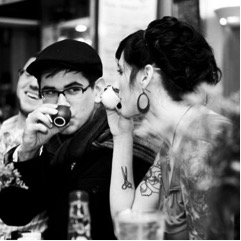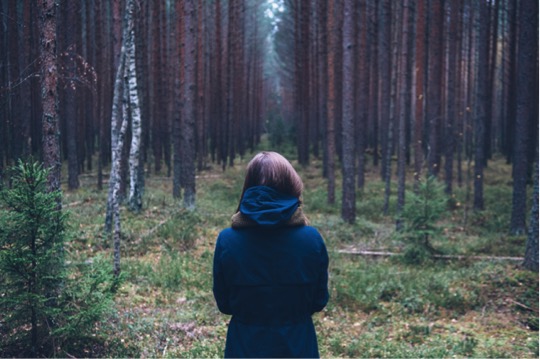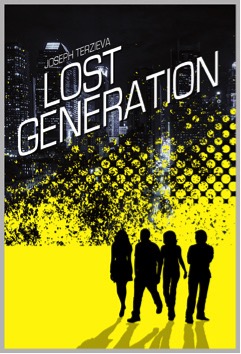My guest for World Builders is another Sword and Laser contest winner from Inkshares. Joe Terzieva, is the author of Lost Generation, and it’s now in production.
 For Joseph Terzieva, the act of storytelling is as essential as the air we breathe. He believes stories are a fundamental aspect of the human experience and finds a narrative rhythm and pacing in all that we observe in the day-to-day life. For him, the heartbeat of stories echoes in the ambiance of a city’s streets, the melodies from every speaker, and in the nuances of human interaction.
For Joseph Terzieva, the act of storytelling is as essential as the air we breathe. He believes stories are a fundamental aspect of the human experience and finds a narrative rhythm and pacing in all that we observe in the day-to-day life. For him, the heartbeat of stories echoes in the ambiance of a city’s streets, the melodies from every speaker, and in the nuances of human interaction.
As a child reading choose your own adventures, Joseph would linger on the early pages before the conflict was introduced, savoring the gentleness of a world at rest. He believes there is a sweetness to not only what drives the story forward, but the presence of character and scenes you can taste, touch, and smell.
Joseph is a husband, father, and a human constantly figuring out the rulebook of life. He is currently finishing up his first published novel, Lost Generation, on Inkshares.
Here now are Joe’s insights on world building.
What aspects of the world do you have to figure out before you start a story? What do you allow to unfold as you write?
Building a world for a story has different requirements than one designed for interactive fiction or a role-playing environment. In a standard story, there is a critical path the reader will follow, so it is not necessary to design a world from top to bottom. At no point will they stop in a chapter and take a path you did not expect. With that baseline in mind, there is a relatively clear delineation of how much planning is required.
When I am starting with the ideation of the world and its characters, I may not have a complete story fleshed out. I try to imagine where the characters are going to go and how much effort should take place up front. As I write up an outline, I continue to expand on what I know about the world, making revisions as needed. For the purposes of storytelling, I guess you could say that I am a just-in-time world builder. I create what is needed right before I need it. If I didn’t do that, I would just play in the sandbox, and nothing would even get done.
It is easy to get caught in a world building trap. As a kid, I loved model railroads. Real or imagined, I love anything that is a miniature representation. Naturally, I get excited thinking about fake towns and how cities are laid out, of different races, people, economies, how they all interact. I was a huge Sim games player, Sim City, Sim Earth, Sim Ant. I love the way different models interact with each other. For me, there is a strong desire to tinker and play, but I need to resist those temptations to complete a story.
After the Sword & Laser contest had ended, I struggled with my worth as a writer. I spent two months of my life doing little but campaigning and now with the opportunity ahead of me I grappled with the pressure and expectations. The story felt dead in my hands and at one point I started building an interactive walking tour of one of the cities in Lost Generation to work out of the rut. To build the work non-linearly would have been a major undertaking. I abandoned it, but it helped me work through my mental stalemate and work on the story proper.
What do you enjoy the most about world building?
The places I write feel real to me, real enough to visit. I would love nothing more than to close my eyes and be transported to walk the streets and see what is in my mind. If you remember the video game Myst, there were at least a couple fiction titles written in that universe. I only read the first one, and it was when I was pretty young, but I remember loving the concept, writers who could build a world in books and then enter them. What an amazing idea. I wanted so badly for it to be real.
Often when I write, the ideas come so naturally. Maybe it is like dreaming. I feel very privileged to discover the world as I write, and it is an incredible honor to share that world with readers. There is so much great work out there, for someone to take a chance on me, I feel very privileged and humbled. It is as if I am a travel guide, leading readers a fantastic place. To be a conduit to an imaginary world feels incredible.
How do you balance realism with magic or other world building elements that allow for departure from the ordinary?
The core consideration to make when deviating from the normal is believability. It is easy to think, as a writer I can write anything, but there are always rules and expectations to follow. Writing a fantastical story is much like pulling taffy, you can bend the shape, warp it to an extent, but if you pull too far, it will break. Writing is a game of trust. When a reader chooses to take a chance on your work, they trust you to build a believable world. From that very first page, you are setting the expectations for that reader. They are dipping their toes into your world and with each page you hint, you ply at what they can consider to be possible. If you do not lay sufficient groundwork, they will abandon you like someone waking from a bad dream. They can step out at any time, and you want to hook them to the end.
I think of the reader when I’m writing, and more importantly when I am reviewing the drafts. Did I telegraph this sufficiently? Will the reader accept this? I feel like a writer should always keep these questions in mind.

Are you modifying your world building process? Do you have any particular things you’d like to improve on?
Continual improvement and self-evaluation are something we should all strive for, in writing and life. I am always thinking about how I might improve my process to be more efficient. As many of the writers on this blog have mentioned, I use Scrivener to write. It is an incredibly fully featured product, so I am always learning new features and finding a way to let them help me improve my workflow. I’ve also started using Aeon Timeline as a tool to validate my drafts and ensure events in the story work chronologically. I’d like to work that into the outlining process.
I want to tell stories more efficiently, so I can produce more content for my readers and also spend more quality time with my family. Making the writing/life-balance work is difficult. I’m interested in anything I can do to improve it.
In your opinion, what is it that makes a believable and immersive world for a fantasy story?
It is the little things that make a world believable. Regardless how epic the scale of your story may be, outside of the main characters, this is a world where people are expected to live their lives. It is important not only to think about the plot and the characters, but also the culture of their surroundings. How do people behave? How do they survive? A good exercise is to write down what a day in the life of a mundane character would be. Doing this give good perspective into whether the world is believable.
I’m a very sensorial person when I am writing a scene. I associate the feel of a specific passage of writing to a color. That’s not specifically valuable to the reader, but it helps me set the tone. When I am visualizing a scene in my head I want to taste, touch, and smell it. I hope some of those senses come off in the writing. The words should be like a blanket or a bathrobe that you wrap around the reader.
How do you deal with contradictions in your story that require large changes to your world? Have you run into this kind of difficult situation and if so how did you resolve it?
I try to do enough planning to avoid contradictions, but occasionally one catches me off guard. There is one in particular in Lost Generation. In the outline, the scene expected the character to go fishing. Unfortunately, by the time I made it to the passage it was winter, and the bay was completely frozen over. The season of winter was instrumental to the tone and visuals of this specific section, but the fishing was an important scene that drove the plot forward. How to get around this? Ice fishing. Okay, I got lucky on that one. I was able to change the scene without sacrificing anything, and it felt natural to the character, but next time I might not get so lucky. It all comes down to planning and experience. Make sure you know where your characters are going to be and if their actions are plausible. Also, it is beneficial to tag your chapters with key events or characters so, in the instance where you need to go back and make a major change, you know where all the instances occur.
Describe your world and some of the considerations behind it that you feel give your stories a solid sense of realism:
I’ve designed a world where automation leaves the majority of citizens without employment. The story revolves around a group of people as they grow up in this environment, what they make of their lives, how they let it define them. In the planning process, a lot of time is spent thinking about people, how they live, what they do, what are the societal impacts. There are fantastic elements, but they are all grounded in a consistent reality, and I make that a primary focus. Do all the pieces line up? Is the payoff earned?
Being an adult is hard. Being a parent is hard. There is a lot of joy, but also a lot of sorrow. I feel as a parent you try to shelter your children from the bad things, paint a pretty picture, so they don’t have to deal with it all right away. At the same time, children from families of different means and situations view the world very differently. The story plays with that perception of world view. These are things that we experience in the day-to-day, and though the world and the environment are not our own, the human element is the anchor that ties the reader to our reality.
When a reader chooses to spend time in my world, they are taking a risk, possibly financial, time-related at the very least. I want to reward that risk with a story that plays with what is possible, but also feels believable.
Be sure to check out Joe’s sci-fi book, Lost Generation:
 Enter into the lives of several individuals as they navigate a society where automation replaces the majority of the workforce.
Enter into the lives of several individuals as they navigate a society where automation replaces the majority of the workforce.
Here is a short excerpt:
Snow fell in heavy sheets and blanketed Hammond Bay all in white. Rooftops took on an icing glaze and the coverage blurred the divide between the walking paths and roads all but for the fire hydrants, little red markers with white caps in a row. By way of the heavy gray clouds in the sky and how light cast itself against the fluffy covering the days looked much like the nights except for the way the shadows moved. And when the darkness did come, it came so gently that eyes did not perceive it until the there was a calm moment to look around and take in your surroundings.
Along the road a taxi carefully crawled, leaving fresh treads, two long lines to mark its path. It moved along the roads in the district where the buildings once stood. The roughshod buildings replaced by with solid foundation, infrastructure, electric strung along the lines above, a network of webbing that brought modern convenience to a place where there was once none. The taxi stopped in front of a social club, The Turned Coin, and idled in its place. The engine hummed with soft revolutions.
After a moment, Claudia stepped out from the taxi, snow already collecting, little flakes that clung to her shoulders and hat in speckled spots. In this time, the place she knew as a child had become unfamiliar. The dramatic collapse and reimagining made this a foreign place and as if anything, now she was a stranger.
If you are intrigued, please go over to Inkshares to find out more.
Inkshares is a crowdfunding publisher who chooses which books to publish based on whether enough readers have shown interest in them. Successful projects have been reviewed in the NYT, US Today, and Washington Post, and have been distributed to numerous bookstores including Indigo and Barnes & Noble.
You can also connect with Joe in the following places:
Website: http://www.josephterzieva.com/
Blog: http://www.josephterzieva.com/blog/
Twitter: @joeterzieva
Facebook: https://www.facebook.com/terzieva.writes

